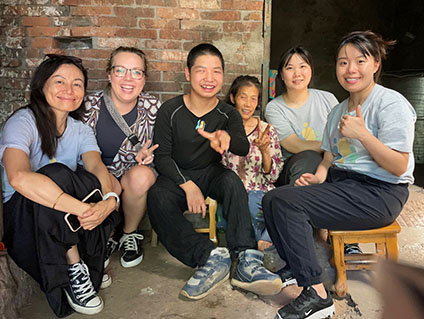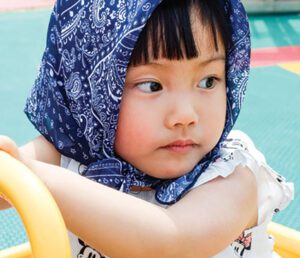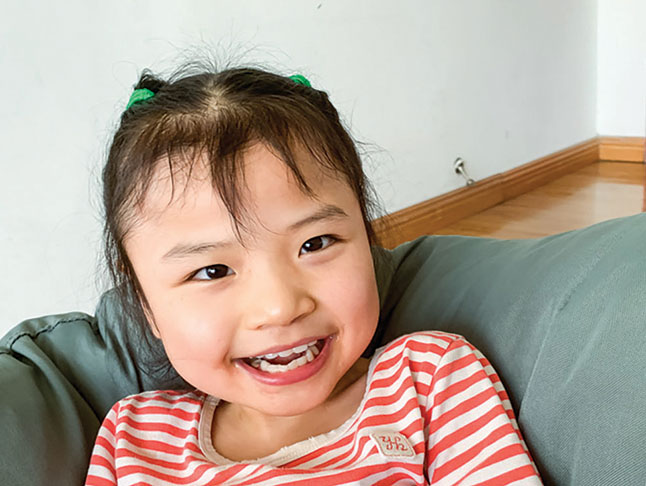From the Heart
Change is in the air! In my hometown, the leaves are changing colors and falling. The night air is crisp and cool and suddenly hearty meals sound appealing. This prompted me to think a little more about change. You see, the Philip Hayden Foundation has been undergoing change for the past three years. Instead of directing a large campus serving a hundred orphans with disabilities, we are partnering with multiple smaller, local organizations to provide for orphans and vulnerable children.
What is NOT changing? Our commitment to transforming the lives of orphans and children with disabilities in China and Mexico and our mission.
“Providing humanitarian aid, medical care and therapy, education, and vocational training with compassion to at-risk orphans and children with disabilities with compassion.”
Change can be hard, even when it is necessary and beneficial. After three years of pursuing new projects, we have been blessed by the gratitude of children like Matías and Jesús and their families. You can find a short video of Matías and his mama on our website in our Stories of Hope.
Because the needs of orphans and vulnerable children in China still exist, PHF is partnering with local Chinese charities throughout China to provide support and love to each precious child. In past issues, you have met Curtis, YiMan, and Clara. These children, and many others like them, have been blessed by your generous donations, providing medical care, therapy, or access to special education.
We are so grateful for your faithful support. Over two-thirds of our Partners in Hope have been donating year after year. Thank you! But we’ve also lost many past donors. Some have struggled with their own life changes. Others may not be sure that a donation directly impacts a child’s life. We can assure you that even though the how and where have changed, the why has not.
Five hundred children in Mexico have school supplies so they can attend school, and 500 children in Mexico receive milk and eggs every month, providing crucial protein for growing bodies. Another ten children receive asthma medication each month.
The end of the year is coming. If you haven’t donated recently, would you consider a year-end donation to transform a child’s life in Mexico or China? Every donation impacts the lives of children in Mexico or China. Our year-end projects will focus on humanitarian aid. Check out our website, Instagram, or Facebook to see the impact of your donation!
Return Visit to China Gives Hope and Presents Challenges
Rebekah Kepha is the founder of Hope Station. Rebekah interned at Shepherd’s Field more than a decade ago and that experience fueled her desire to provide support and hope to vulnerable children in China. Hope Station is now a registered Chinese-run charity. Philip Hayden Foundation has supported them for the past few years in their work to keep children in families. We love to see their impact on families!

After 3 years away, I wasn’t sure what to expect during my trip back to China.
I founded Hope Station in 2012, and lived in China from 2015-20. We served children with disabilities in orphanages, then transitioned to serve children with disabilities and their families in 2019. When I left China in 2020, our local Chinese staff team took over daily operations. I never imagined it would be so long before I could go back for a visit.
As I stepped off the plane, I was nervous. China has drastically changed in 3 years as the entire population experienced a roller coaster of lockdowns, social change, and great loss. What would I find as I reunited with our staff team and met the children and families we serve?
Here’s the honest truth: I was surprisingly encouraged by some of the changes happening there. But I was also deeply saddened by some of the needs I saw.
I had the honor of meeting most of the children and families we serve. I walked into each family’s home, sat next their children, received their generous hospitality, and listened to their joys and struggles in raising their child with a disability.
Each family’s situation was unique. After all the home visits I made with our team, these common threads that stuck out to me:
I was encouraged by all the parents’ deep love for their child. The hardships these families face are great, but without fail every parent I talked to was unwavering in their devotion to their child. I ended every conversation with a parent by telling them I could see how much they love their child, and that they are doing an amazing job. Many of them were brought to tears.
I was encouraged by the growing number of therapy centers, support organizations, helpful resources, and loving individuals who are stepping up to care for children with disabilities. Our team is growing an amazing network of supportive people who have the capacity to really make a difference for these families.
Even in light of these positive threads, there is still MUCH work to be done. Families are facing major obstacles as they struggle to raise their children the best way they know how.
I was deeply saddened by how many parents shared about their child not being accepted or supported at school. Most local schools still do not a place for children who need additional learning support or have special needs. The schools designed exclusively for children with special needs are not free, and they can’t always serve the individual child’s unique learning needs either.
XuanXuan, for example, is the first child in the entire province with blindness to go to public school. Her mom sits next to her in the front of the class and reads to her every single word on the whiteboard, helps her read all her tests, and handwrites all of her answers for her.
I was deeply saddened by the number of parents struggling with their mental health. Our team has found that one of the most significant indicators of a family’s overall health is whether the parents feel supported and hopeful about their child’s future. So many parents carry the entire weight of their child’s future on their own shoulders with no support from their community.
When I asked one mother how Hope Station has helped her this past year, she shared with me that before they joined our program she didn’t have any motivation for living. The only thing that stopped her from taking her own life was the fact that her son had no one else to care for him. Through Hope Station, she’s received some counseling, and that has changed everything for her.
I was deeply saddened by how difficult it is for families to find the right services for their child. The number of resources available in China is growing… but it is still difficult for families to find those resources. Whether they need a specific type of therapy for their child or they need to find a doctor who can help diagnose their child’s needs, it is still extremely difficult to find the right resources.
There is much to do. The encouraging changes have us hopeful. And the continued struggles motivate us to do everything in our power to support these families and their children.
I am so thankful for the amazing support Philip Hayden Foundation and other donors have shown in this season. Together, we keep pressing on to keep children in families.
Spina Bifida Awareness Month
Spina Bifida is the most common central nervous system birth defect, affecting one child in every 2,000 births. In this defect, the spinal column doesn’t form properly, leaving a section of the spinal cord and spinal nerves exposed through an opening in the back. Myelomeningocele (my•e•lo•me•nin•go•cele) (MMC) is the most common and the most severe form of spina bifida.
While the lesion can be found at any level on the spine, it is most often found on the lower back. Lesions at higher levels usually result in more severe complications. Sometimes, an additional complication of hydrocephalus occurs, which can damage the brain.
Spina Bifida Prognosis and Continuing Care
Most children born with spina bifida survive but will need long-term continuing care. The type of care needed depends on the medical needs of the child. The care may include:
- Bladder and bowel management and care
- Mobility aids
- Physical Therapy
- Pressure sore management
- Ophthalmology, nephology, or specialty surgeons
- A nutritionist or feeding specialist
Over the decades of transforming the lives of orphans in China, the Philip Hayden Foundation has provided medical care for several children with spina bifida. Check out our Stories of Hope or newsletter archives to read about Simeon, Galvis, and Elizabeth. You can read more about spina bifida on our website in Stories of Hope.

Ellie was born in 2019 with spina bifida. She loves to talk and often copies others when they say words or make hand motions. She enjoys imaginary play—especially cooking, tea parties, and taking care of her “baby” (teddy bear). She has no trouble getting around her room using her ZipZac chair! She loves to keep up with her friend Judy-Alexis as they race down the hallway to their physical therapy class. Ellie has a darling personality and loves cuddles with her nannies and nurses. Ellie is one of the children in the New Hope Foundation Healing Home supported by PHF.
Every Donation Makes an Impact
Did you know that every donation transforms a child’s life in Mexico or China? Most of us are experiencing the need for some belt-tightening and must reconsider where we spend our money. Even a small donation from you makes an unforgettable impact in a child’s life – and often in their parent’s life too!
- $10 provides a meal for a family at a free health fair in Mexico.
- $10 provides school supplies for a child in Mexico.
- $25 provides milk and eggs for a child for one month.
- $35/month provides access to special education for an autistic child in China.
- $50/month provides asthma medication for a child in Mexico, giving the gift of healthy breathing.
What if you begin planning to make a year-end gift to impact a child’s life? For a child living in extreme poverty, your compassionate gift speaks volumes. Your gift is a tangible expression of care and speaks volumes. One parent commented this way.
“When I’m alone, I always wonder what kind of people you are to be willing to help us strangers just because of the love in your heart. I’m really touched.”
Maybe this year, you’d like to make a tribute gift honoring a beloved teacher, parent, or therapist. Just let us know who you’d like to honor when you donate, and we will send a handwritten note to that person. Your gift, regardless of the size, impacts lives.

